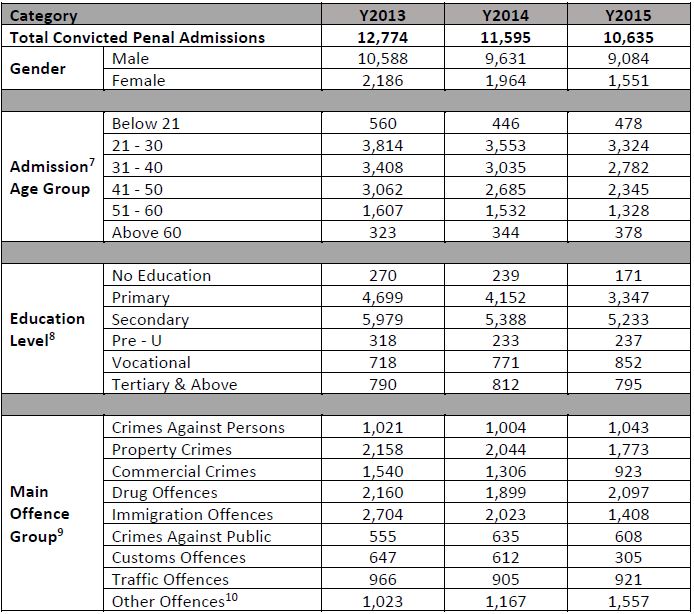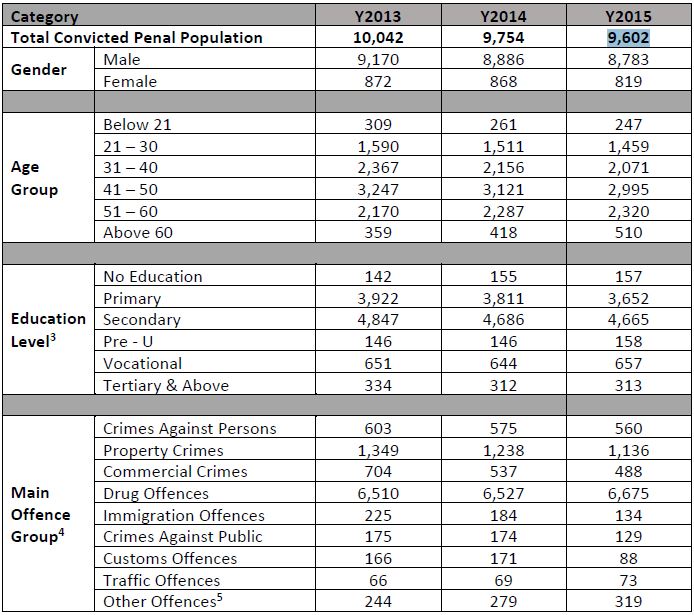Recidivism rates remain 'low and stable' due to strong community support for inmates: Prison Service
Sign up now: Get ST's newsletters delivered to your inbox
SINGAPORE - More inmates will receive stronger community support during and after their release from prison, in a bid to break the cycle of re-offending.
The use of community-based programmes, where inmates are able to serve the tail-end of their jail term outside prison walls, have helped to keep overall recidivism rates "low and stable", according to the Singapore Prison Service (SPS).
In its latest annual figures released on Wednesday (Feb 17), the total percentage of inmates who re-offended within two years from their release dipped 1.7 per cent as compared to the previous year.
It is 25.9 per cent for the cohort released in 2013, compared to 27.6 per cent for the 2012 cohort and 27.4 per cent for that in 2011.
Figures also showed fewer people being admitted into prison last year. There were 10,635 convicted penal admissions in 2015, compared to 11,595 such admissions in 2014 and 12,744 in 2013.

As at Dec 31 last year, the overall penal prison population stood at 9,602, with female inmates making up some 8.5 per cent. The figure was 9,754 in 2014 and 10,042 in 2013.

"It's what they do outside that counts, (which is) most importantly, to stay crime free and to not re-offend," he said, while stressing the importance of community partnerships in ensuring that inmates do not go back to their old ways.
Prior to their release, inmates are assessed if they are suitable for community-based rehabilitation and reintegration programmes based on their needs and risks.
Prison officers will consider criteria such as the nature of their offences, their conduct in prison and the presence of family support.
Inmates with lower risk of re-offending and have strong family support may be placed on the Home Detention Scheme,while those who require a more structured environment may be placed in the Halfway House or Work Release Schemes.
Ex-offenders with a greater risk of re-offending and require more aftercare support will be placed on the Mandatory Aftercare Scheme upon their release.
For at least six months, these inmates and ex-offenders will be supervised and counselled by officers from various community and government agencies, such as the Singapore Anti-Narcotics Association (Sana).
"We will contact inmates through phone calls or face-to-face meetings to get updates. Together with the case workers, we try to tackle any issues they may face," said reintegration officer Mohamed Azhar Khaili.
Meanwhile, more employers are being roped in to provide suitable jobs for inmates, even prior to their release.
The Singapore Corporation of Rehabilitative Enterprises (Score) has tied up with more employers from the food and beverage, hospitality, logistics and manufacturing sectors to increase support for the hiring of ex-offenders.
Last year, 4,745 employers were registered with Score, a 7 per cent increase from 4,433 in the 2014.
In addition, 2,042 inmates secured a job while still in prison last year, a 9.5 per cent increase from the 1,865 in 2014.
A memorandum of understanding between Score and the Restaurant Association of Singapore (RAS) inked last August could have contributed to the positive trend, a Score spokesman said.


